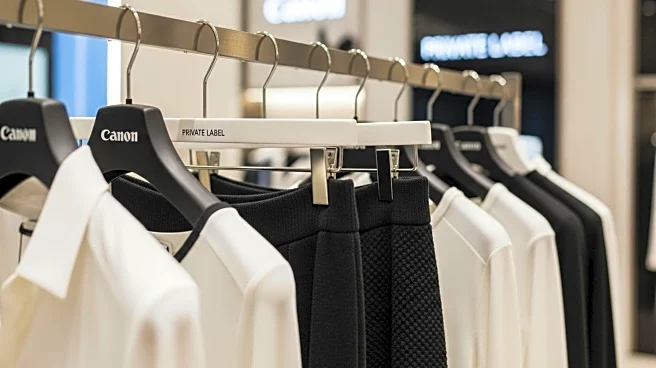What's Happening?
Destination XL, a men's big and tall retailer based in Canton, Massachusetts, is shifting its focus from national brands to its private label offerings. This strategic move comes after the company reported a net loss of $265,000 in the second quarter, compared to a net income of $2.4 million in the same period last year. Sales fell by 7.5% to $115.5 million, with comparable-store sales down 9.2%. The company plans to increase its private label penetration from 56.5% to over 65% by 2027, aiming to improve margins and customer loyalty. CEO Harvey Kanter highlighted the macroeconomic challenges affecting consumer spending and emphasized the need to adapt to changing consumer preferences.
Why It's Important?
The shift towards private labels is significant as it reflects broader trends in retail where companies seek to control costs and improve margins. By focusing on private labels, Destination XL can better manage its supply chain and pricing, potentially offering more competitive prices to consumers. This move could also enhance brand loyalty, as private labels often provide unique products not available elsewhere. However, the strategy comes amid increased competition in the big and tall market, with other retailers expanding their offerings in this segment. The company's ability to navigate these challenges will be crucial for its future success.
What's Next?
Destination XL plans to continue evaluating its national brand portfolio, potentially eliminating underperforming brands. The company is also expanding its digital sizing technology, Fitmap, to more stores, aiming to enhance customer experience. Additionally, Destination XL is revamping its promotional strategy to emphasize value and competitiveness. The company faces potential price increases due to tariffs, which could impact consumer spending. Future store openings are on hold until market conditions improve, but the company remains optimistic about its long-term prospects.
Beyond the Headlines
The focus on private labels may have ethical implications, as it involves controlling the entire supply chain, which can affect labor practices and sourcing. Additionally, the shift could influence cultural perceptions of brand value, as consumers may increasingly prioritize price and uniqueness over brand prestige. The competitive landscape in the big and tall market is evolving, with traditional retailers entering the space, potentially altering consumer loyalty dynamics.










